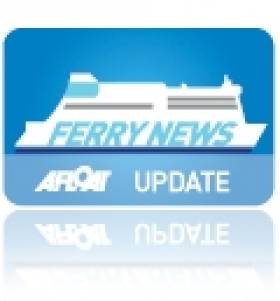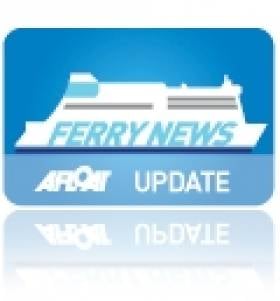Displaying items by tag: Transfennica
New Spain-UK-Belgium Ro-Ro Freight Service
#NewSpainUKfreight -Transfennica, the Dutch based freight operator, have recently started a new twice-weekly freight service from northern Spain to include a call to UK before an onward arrival in Belgium.
The new 'triangular' starts from Bilbao via Portsmouth, giving customers a direct connection and faster transit times from Spain to the UK and the added benefit of onward connections to Zeebrugge, before the service returns to Iberia.
Stena Forecaster (as pictured above in the English Channel) and a sister Stena Forerunner are ro-ro vessels with a capacity for 100 trailers, 150 double-stacked containers and 12 drivers.
The 24,688grt sisters both built in 2003, were recently required to server the Belgium-Spain-UK network.
On the Tuesday and Friday evening sailings from Bilbao will call Portsmouth on Thursdays at 06.00 hrs and on Sundays at 07.00 hrs.
When freight is unloaded in the UK, containers will be loaded as well as unaccompanied trailer units will be boarded bound for Zeebrugge.
This will enable clients to make efficient combinations in Portsmouth by dropping off empty or loaded units for Zeebrugge and/or Bilbao.
Customers now have the option to ship a substantial part of their Thursday and Friday collections during the weekend and to deliver all over the UK by Sunday evening/Monday morning.
There is also the added advantage that driver accompanied operators from the South West of England can use this route to Belgium.
As well as 12 driver accompanied, unaccompanied and containers, the direct service to Portsmouth is perfectly suited for out of gauge, heavy, mafi, project and hazardous cargo. In January, Transfennica replaced two smaller chartered vessels for the 'Stena' pair.
Martin Putman, Port Manager of Portsmouth International Port comments: "We welcome this initiative from Transfennica which has already established its credentials in the Spanish unaccompanied market. This new service will give freight customers using Portsmouth even greater choice and we look forward to developing this trade.
Eric de Wit, Director of Transfennica explains: "We believe the market is ready for an unaccompanied solution connecting Spain, the UK and Belgium. This will allow transport companies to efficiently use their own trucks in the UK and use the Portsmouth to Zeebrugge sailing to balance their cargo flows. The availability of other sailings, both in Portsmouth as well as in Zeebrugge, increases flexibility and efficiency. We are confident that we are introducing a service that the market needs."
Transfennica is part of the Spliethoff Group, one of the largest ship owners in the Netherlands.
The new service will compete with another newcomer, LD Lines whose freight services also provides for passengers on routes from the UK and northern Spain. In addition, Brittany Ferries which run services also from UK south coast ports to northern Spain.
‘Proposed’ Cork-Spain Route Remains Under Review
In addition to services running out of Rosslare operated by Celtic Link Ferries and Irish Ferries and the alternative option of landbridge connections to Europe via the UK.
In the meantime, the Port of Cork will continue to be in dialogue with potential operators and investor's, however in the current climate it is proving more challenging to establish the service. Yet both the port authorities in Cork and Gijon remain committed in establishing the first direct Irish-Iberia passenger ferry route, with an update on the Spanish service due in early June.
Since 2008 the port authorities of Cork and Gijón, through the Promotion of Short Sea Shipping and Co-Operation with Small Medium Enterprise's (Proppose) an EU Inter-Reg project, have conducted feasibility studies into the service.
Interest in the service to date, has shown interest from Brittany Ferries, P&O Ferries and Transfennica, a Scandinavian based operator. It was envisaged that a ro-pax type of vessel would operate the 24-hour route to Gijón in Asturias, the region which forms part of Spain's northern 'Green' coast.
The route across the Bay of Biscay would be an attraction to freight hauliers, saving mileage and reduced fuel costs in addition avoiding a weekend ban to trucks travelling through France.
Last summer the ro-pax Norman Bridge started a new route between Nantes / St. Nazaire (Montoir-de-Bretagne) and Gijón, operated by GLD Atlantique. This route received support through the EU 'Motorways of the Seas' (MOS) programme to divert vehicle traffic from congested road-infrastructure and transferred to designated shipping routes, using larger and faster ro-pax vessels.
The route's opening was marked with a declaration signed by Dominique Bussereau, the French Minister of State responsible for Transport and his Spanish counterpart Magdalena Alvarez of the first of two Franco-Spanish MOS concept routes, starting with the 14-hour GLD Atlantique service.
- Irish Ferries
- port of Cork
- Celtic Link Ferries
- Fastnet Line
- P&O Ferries
- Brittany Ferries
- Ports and Shipping News
- Cork Harbour News
- RoPax
- Port of Gijón
- Proppose
- Motorways of the Seas
- MOS
- Transfennica
- CorkGijón
- Asturias
- 'Green'Spain
- Landbridge
- NantesSt.Nazaire
- GLD Atlantique
- Norman Bridge
- Cork Harbour






























































